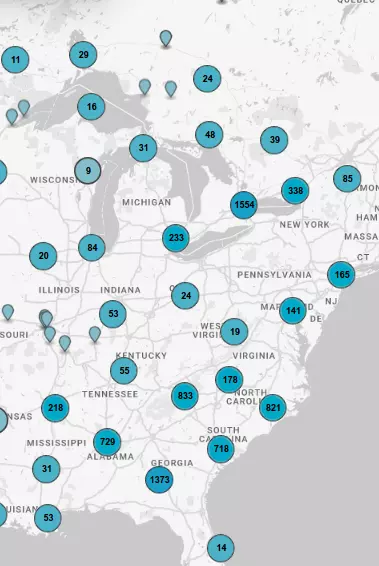Federal Trenches
Federal Trenches During the night of October 4, Federal troops anxiously awaited in their defenses for the attack they knew would come. Harvey M. Tremble at the 93rd Illinois Regiment...
- lat34
The Eastern Redoubt
The Eastern Redoubt The eastern redoubt was constructed with six-foot tall earth parent and a six-foot deep ditch surrounding the fort on all sides. Gun embrasures allowed cannon to be fired at...
- lat34
The Crows Nest
The Crows Nest At this approximate locations stood the Crow´s Nest, a sixty-foot tall Georgia Pine surmounted by a signal platform. Before and after the battle, information to General Sherman...
- lat34
Military Service Road
The Federal defenses at Allatoona included a military service road that crossed the Tennessee Wagon Road at this point. The military road connected the fortified positions at the Eastern Redoubt...
- lat34
Allatoona Mountain Range
The Allatoona Mountain range is the southernmost spur of Appalachian Mountain. Years before the war, Lieutenant William T. Sherman spent time surveying this area for the U.S. Army; therefore, he...
- lat34
Tennessee wagon road
Tennessee Wagon Road Known as the Tennessee Wagon Road, this heavily traveled route passed over the Allatoona mountain range and north to Chattanooga, Tennessee. South of Allatoona Pass, this road...
- lat34
A Demand for Surrender
A Demand for Surrender On the morning of October 5, 1864, following a two hour bombardment from Major John D. Myrick´s Confederate artillery on Moore´s he´ll located 1,200 yards to the...
- lat34
Nellie Margaret Harris Applin
In Memory of Mayor Margo Martin Nellie Margaret Harris Applin side one: Dedicated in 2007, the Kingston Veterans Monument, vision in 1999 by Ms. Nellie Margaret Harris Appling, stands in honor...
- lat34
The Battle of Allatoona Pass
The Battle of Allatoona Pass Allatoona Pass is the site of significant and bloody Civil War battles that took place after the fall of Atlanta in September 1864. With no city to defend,...
- lat34
Rowett's Redoubt
Rowett´s Redoubt "Our company [Company G] went over the works - the only bayonet fight we ever were in during the war - God grant that we many never witness another scene like that." Private B.F....
- lat34
Assault on the Star Fort
Assault On The Star Fort By 11:00 a.m., after overrunning Rowett´s Redoubt , Confederate attack swept up his hill and the west and the north, forcing the Federals to retreat inside the Star Fort....
- lat34
Confederate Withdrawal
Confederate Withdrawal "A shout trying to roll over those fields … men grasp hands and shouted … and embraced each other. The wounded joined in the delirium of rejoice. The dying looked to the...
- lat34
Inside the Star Fort
Inside the Star Fort The "Star Fort" was constructed 6-foot high earthworks or parapets, with a 6-foot deep trench completely surrounding the fort. The earthen walls were topped with interlacing...
- lat34
The Foot Bridge
The Foot Bridge At this point, a crude wooden bridge spanned the cut about 90 feet above the railroad tracks. It was constructed felling by two pine trees across the cut, planking over them...
- lat34
The Railroad
The Railroad Chartered by the state of Georgia in 1837, workmen completed the Western & Atlantic Railroad in 1850 over a winding 137-mile route from Atlanta, Georgia, to Chattanooga, Tennessee. At...
- lat34
Federal Trenches
Federal Trenches During the battle, these trenches were manned by troops at the 12th Illinois Infantry Regiment who repulsed Confederate troops for the 35th and 39th Mississippi regiments to their...
- lat34
Refuge From Deadly Fire
Refuge From Deadly Fire Small contingents of the 35th and 39th Mississippi took refuge in the deep gully to the right where they could neither advanced up the slope will retreat for fear of being...
- lat34
The Deep Cut
The Deep Cut The immediate level, directly below the top, is a berm or shoulder excavated to prevent earth from falling into the cut and blocking the tracks and corresponds to the top of the rock...
- lat34
4th Minnesota Regimental Headquarters
4th Minnesota Regimental Headquarters On this site stood a wood frame dog- trot style channels served as the Regimental Headquarters for the 4th Minnesota Regiment, the permanent Federal...
- lat34
Wartime Allatoona
Wartime Allatoona In 1866, George N. Bernard photographed Allatoona looking north from approximately the same location is this marker. The Western & Atlantic Railroad from Atlanta to Chattanooga...
- lat34
